Dell Studio XPS 16: the Eyes Have It
by Jarred Walton on April 2, 2009 6:00 PM EST- Posted in
- Laptops
Gaming Performance
We've chosen to focus on "reasonable" settings for the games below. That means we run Assassin's Creed and Company of Heroes in DX9 mode at maximum detail setting - DX10 reduces performance by quite a bit in AC and by a much larger amount in CoH. We run Crysis at Medium settings (for reference, High detail drops performance almost in half: 8.8 FPS for the XPS 16 at 1680x1050). The remaining games are at maximum detail settings, but without any anti-aliasing.
Again, we chose to focus on 1680x1050 as a baseline performance comparison, and we will do so with other laptops going forward. If necessary, we will use an external LCD to run at that resolution. Besides 1680x1050, we will also include results at the native LCD resolution, and for less powerful laptops like the Studio XPS 16 we will add 1280x800 performance. (Note that performance at 1366x768 - a 16:9 aspect ratio - is virtually identical to results at 1280x800.) Ideally, you would want to run any laptop at the native LCD resolution, but depending on the game and your hardware that may not be practical.
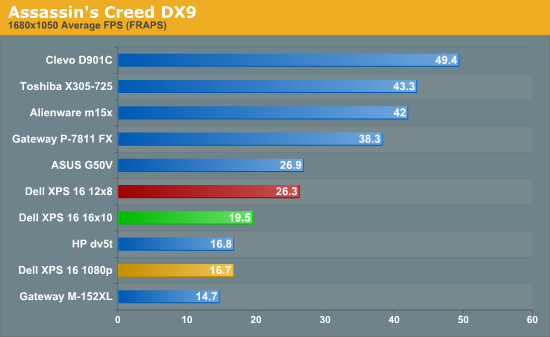
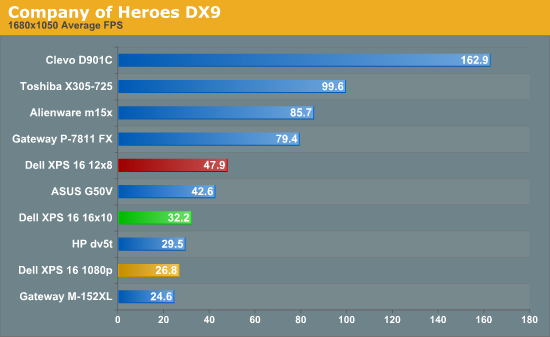
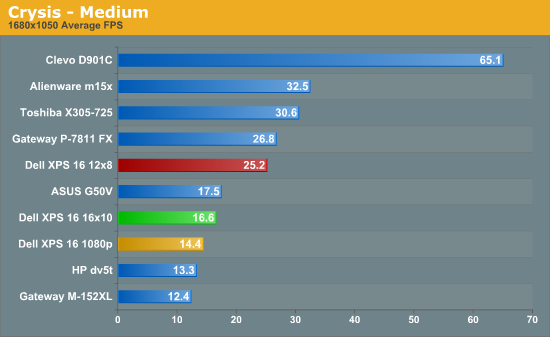

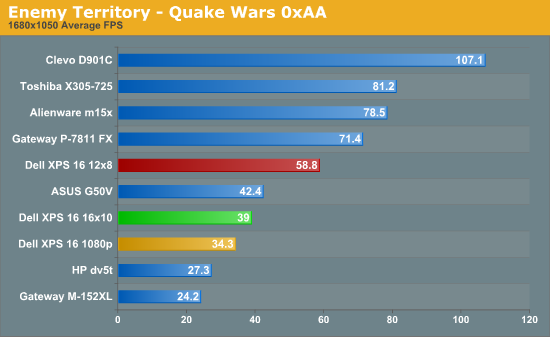
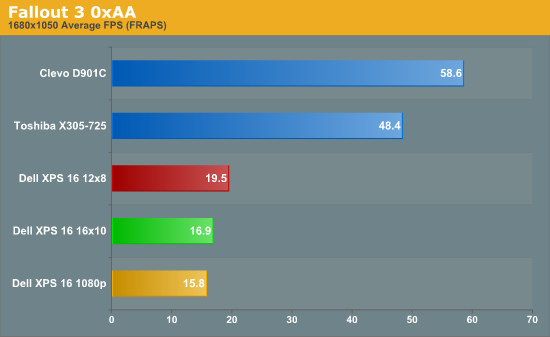
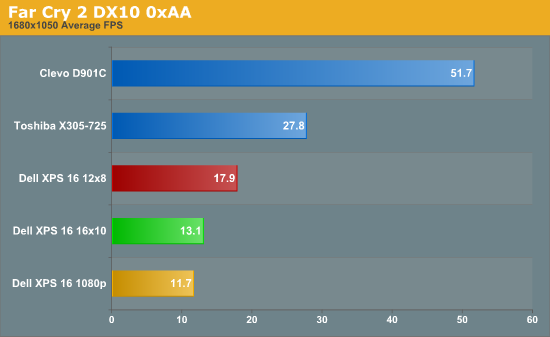
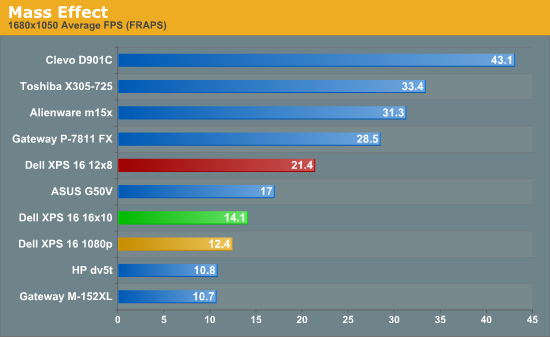
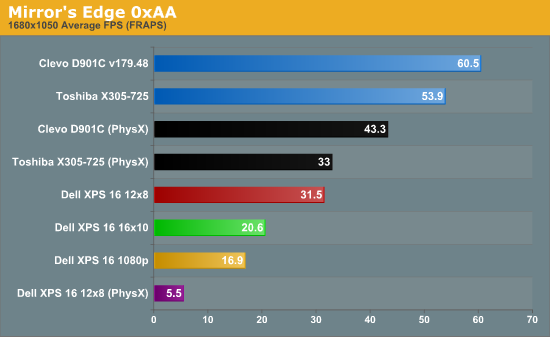
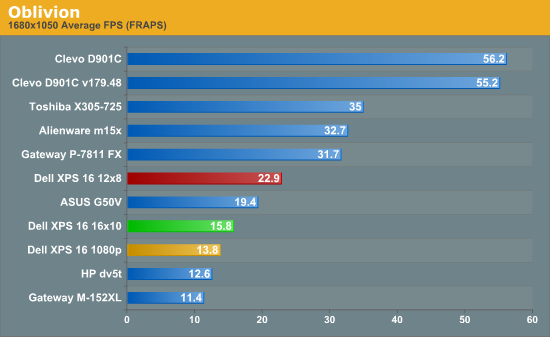
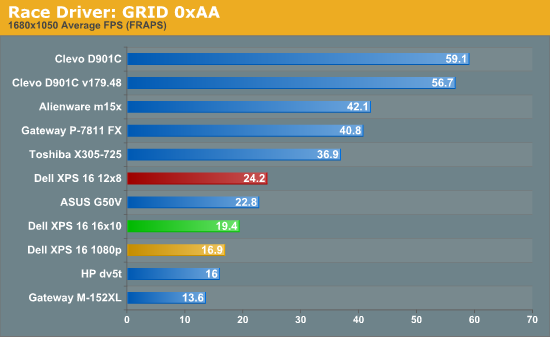
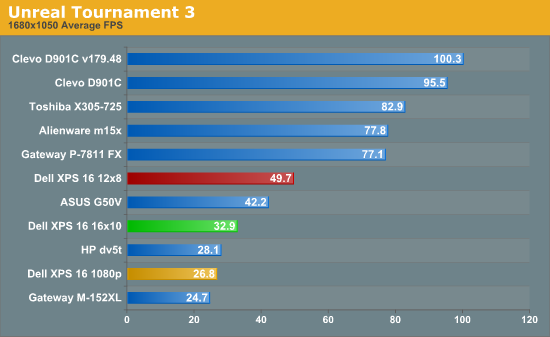
The gaming results are what you would expect from a Radeon HD 3670. If you look at the green bar, which represents equivalent performance at 1680x1050, the Studio XPS 16 is slower than the GeForce 9700M GT in the ASUS G50V but stays well ahead of the GeForce 9600M GT in the HP dv5t. Another way of looking at it is that performance at 1280x800 is almost equal to what you can get from the 9700M GT at 1680x1050; conversely, 1080p performance essentially matches the 9600M GT at 1680x1050.
As we mentioned earlier, we performed the initial benchmarks using outdated drivers. Updating to the latest drivers from Dell's website improved performance by 3-5% in several titles that we checked (Far Cry 2, Crysis, and Unreal Tournament 3). That's not a big enough change to affect the standings or our recommendation, but if you get an XPS 16 you'll want to verify that you're running the latest drivers.
Put simply, if you are interested in purchasing a laptop that can provide reasonable gaming performance, you really need at least a GeForce 9700M and preferably a 9800M - or a Mobility Radeon HD 4650 and preferably a 4830 from the ATI side. It's not that you can't game on lower end graphics solutions, but there are plenty of titles where you will need to drastically reduce resolution or detail settings in order to provide acceptable frame rates. As far as ATI versus NVIDIA goes, the latest ATI products do a great job at closing the performance gap that has existed for a while now in the mobile sector - we will have a look at a notebook in the near future that might even take the performance crown from NVIDIA.
The driver situation muddies the waters greatly, however, and we would really have a difficult time recommending against NVIDIA for a high-end gaming laptop unless and until ATI begins to offer "mobile reference drivers". Yes, it's possible to hack desktop drivers and make them work, but that definitely isn't the preferred solution. It's also a little disconcerting that when you go to ATI's website and look for Mobility Radeon drivers, many options aren't even listed - for example, the 3600 series used in the Studio XPS 16 is entirely absent. NVIDIA also has CUDA and PhysX to further tilt the scales in their favor, if you buy into the marketing. Overall, the Mobility HD 3670 is decent, but there are now better options. Unfortunately, adoption of new mobile GPUs often lags behind their official release by several months, which is why this new Studio XPS 16 uses a GPU that launched early last year.










79 Comments
View All Comments
bowerfind - Thursday, September 10, 2009 - link
In your review of the Dell XPS16 Studio notebook, the RGB LED 1080p was highly recommended. Dell offers both a 15.6" and a 16.0" edge to edge glass screen. Dell assures me that both of these displays are of equal quality. Which of these 2 displays was examined in your review and do you agree that they are both of equal quality?JarredWalton - Thursday, September 10, 2009 - link
The display tested was a 1080p 16.0" model, so I don't know about the 15.6" LCD.arst - Saturday, August 1, 2009 - link
just want to know is there any gamut data between 13~14 inch display laptop? this article show only 15 inch upper laptops..tOM Trottier - Monday, August 3, 2009 - link
Alas, this doesn't cover the wide gamut laptop screens from Sony (on Vaio AW series) nor Lenovo (Thinkpads with "Flexview"). The Sony, in particular, is supposed to have about ~136% of Adobe RBG gamut.tOM
arst - Monday, August 3, 2009 - link
thx for replyalright, I think i should give up to choose 13~14 inch screen laptoop
does anyone know any good 15 inch one?
griddley - Sunday, July 12, 2009 - link
Hmmm.. looks like this thread could be dead. But thought I'd ask anyway: Anyone get this sxps 16 with the 1G GPU option? I am concerned about an increase in system noise over the 3670.I want to replace a first-gen xps whose fans run all. the. time. (and I clean them regularly!)
mlarma - Wednesday, April 22, 2009 - link
I got one from the Dell outlet store. Let me say that these things are hot tamales there and you'll need to keep tapping refresh or whatever on the filter for the laptop type and when you see one add it to the cart then decide if it is what you want. If not, remove it. Took me an hour of hitting refresh to get the following for $1269:Studio XPS 16
- T9550 (2.66GHz, 6MB Cache, 1067MHz)
- 4GB (2x2GB DDR3, 1067MHz)
- 500GB 7200RPM drive (with fall sensor)
- DVD-RW
- 1920x1080 screen (this of course was a must have)
- 5100 wifi card option
- Bluetooth
- 2.0MP Camera with facial recognition
- 6 cell battery
- Vista Ultimate 64-bit/SP1
- Standard 1 year warranty, on-site after on-phone diag
I'm super stoked. Plan on having dual boot with Linux and Vista. I've toyed with a few Linux flavors. Anyone with one of these laptops have a preference?
CStyles357 - Tuesday, April 21, 2009 - link
This should have been compared with the HP HDX 16-1140US Notebook PC - $1,149.99Intel Core 2 Duo P8600 2.4GHz Dual-Core X64-Bit Mobile Processor
4GB DDR2-800 (2x 2GB) PC2-6400 (400MHz) Cas 5 Latency, 5-5-5-15 Timing Memory Max up to 8GB
Seagate Momentus ST9500325AS 500GB, 5400RPM, 8MB Cache, SATA 3.0Gb/s
HardDrive w/HP ProtectSmart HD Protection
Sony NEC Optiarc AD-7543A LightScribe Super Multi 8X DVD+R/RW
w/Double Layer Support Multimedia Drive
Samsung 16.0" WSXGA + High-Definition HP Ultra BrightView Infinity Widescreen Display (1920x1080)
NVIDIA GeForce Go 9600M GT Graphics w/2302MB Shared Video Memory
(500MHz DDR2 GPU Clock, 512MB, 128Bit, 65nm), DirectX 10, HD Pure Video,
128bit FP – Graphics Processing Unit
Realtek RTL8168/8111 Integrated 10/100/1000Mbps BASE-T Ethernet LAN
Wireless 802.11a/b/g/n integrated WLAN
Intel WiFi Link 5100AGN w/Bluetooth 2.0 Wireless Technology
5-in-1 integrated Digital Media Reader
Altec Lansing Dolby Home Theater Speakers w/Sub-Woofer & Integrated Digital Microphone
HP Imprint Finish with Integrated 1.3 Megapixel Webcam & Fingerprint Reader
3 USB 2.0 ports + 1 eSATA/USB port
7Enigma - Tuesday, April 14, 2009 - link
Thanks again for including "lower/higher is better" in the display portion of the review. Makes browsing that section much easier for some of us.I did have a question as to why it seems the Apple products only show up in the benchmarks they do well at (typically the battery life). Where is the x264 benchmark and the rest? I know some of the benchmarks may not have Mac OS compatibility but is just seems like they are only in benchmarks they do well at.
JarredWalton - Thursday, April 16, 2009 - link
Well, I didn't test the MacBooks - that's Anand - and the different OS severely limits the amount of comparing we can do. Playing DVDs or surfing the 'net isn't all that different on OS X, Linux, etc. so we can compare that aspect. Worth note is that MacBook battery life under Vista drops in half... driver problem, or the underlying OS? You decide.